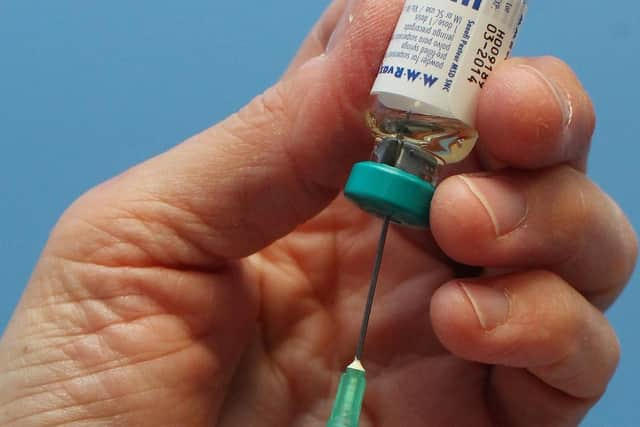Measles: What are symptoms of the infection, how can I avoid spreading or catching measles and what is the vaccine? The NHS explains
Since October 1, 2023, there has been an increase in measles cases across England and between that date and February 13, 2024, there have been 521 cases reported in England, with seven per cent of those cases being in Yorkshire and The Humber.
The majority of these cases have been in children under the age of 10 years and 25 per cent (133 of 521) in young people and adults over the age of 15 years and most of these cases have been unvaccinated.
Advertisement
Hide AdAdvertisement
Hide AdHere is everything you need to know about measles and how to spot them.


What are the symptoms of measles?
Measles is an infection which spreads easily and can cause serious problems in some people.
The infection normally begins with cold-like symptoms, followed by a rash a few days later and some people may also get small spots in their mouth.
Cold-like symptoms include: a high temperature, a runny or blocked nose, sneezing, a cough and red, sore, watery eyes.
Advertisement
Hide AdAdvertisement
Hide AdSmall white spots may also appear inside the cheeks and on the back of lips a few days later.
A rash usually appears a few days after the cold-like symptoms.
The rash starts on the face and behind the ears before spreading to the rest of the body. They’re not normally itchy.
It looks brown or red on white skin and it may be harder to spot on brown and black skin, according to the NHS.
Advertisement
Hide AdAdvertisement
Hide AdIt’s very unlikely to be measles if you’ve had both doses of the vaccine or you’ve had measles before.
You must ask for urgent GP appointment or get help from NHS 111 if you think you or your child has measles, if you’ve been in close contact with someone who has measles and you’ve not had measles before and not had two doses of the vaccine, you’ve been in close contact with someone who has measles and you are pregnant or you have a weakened immune system and think you have measles or have been in close contact with someone who has measles.
How can I avoid spreading or catching measles?
Measles usually heals in about a week.
Once you have visited your GP, there are things you can do to mask the symptoms and reduce the risk of spreading the infection.
It can help to rest and drink plenty fluids, such as water, to avoid dehydration, take paracetamol or ibuprofen to reduce a high temperature, do not give aspirin to children under the age of 16 and use cotton wool soaked in warmth to gently remove any crusts from you or your child’s eyes.
Advertisement
Hide AdAdvertisement
Hide AdMake sure your child stays off nursery, school or you stay off work for at least four days from when the rash first appears.
Also make sure you try to avoid close contact with babies and anyone who is pregnant or has a weakened immune system.
Measles spreads when an infected person coughs or sneezes so there are things you can do to reduce the risk of spreading or catching it.
Make sure you wash your hands often with soap and warm water, use tissues when you cough or sneeze and throw used tissues in the bin.
Do not share cutlery, cups, towels, clothes or bedding.
Complications of measles
Advertisement
Hide AdAdvertisement
Hide AdJust like with many other infections, measles can also lead to serious problems if it spreads to other parts of the body, for example the lungs or brain.
Problems that can be caused by measles include: pneumonia, meningitis, blindness and seizures (fits). While these problems are rare, some people have a higher risk of developing them including babies and people with lowered immune systems.
There is a higher risk of harming your baby if you get measles while you are pregnant.
It can cause: miscarriage or stillbirth, premature birth (prior to the 37th week) or your baby may have a low birthweight.
Advertisement
Hide AdAdvertisement
Hide AdIt is important to get medical advice if you catch measles while you are pregnant or you have been in close contact with someone who has measles and you are pregnant.
You must call 999 or go to A&E if you or your child has measles and shortness of breath, a high temperature that does not come down after taking paracetamol or ibuprofen, confusion or seizures.
What vaccine do I need to protect me from measles?
The MMR vaccine can prevent measles and it also protects you from mumps and rubella.
The MMR vaccine is offered to all children in the UK; two doses give lifelong protection against measles, mumps and rubella.
Comment Guidelines
National World encourages reader discussion on our stories. User feedback, insights and back-and-forth exchanges add a rich layer of context to reporting. Please review our Community Guidelines before commenting.
